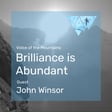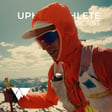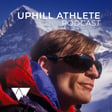
Gabe Joyes and Multi-Day Stage Racing
The Uphill Athlete podcast welcomes mountain athlete, ultra runner and Uphill Athlete ambassador Gabe Joyes for a discussion with host Alyssa Clark. Gabe and Alyssa discuss his journey from being a backpacker to transitioning into competitive trail and stage racing, including his recent third place finish in the Dragon's Back Race in Wales. They break down his training approach, gear choices, challenges he faced, racing strategies, and his favorite aspects of the race. Gabe credits years of consistent training, adaptability, and thoughtful preparation for his success and shares his wisdom with listeners interested in stage racing or multi-day events. Tune in for a fun and enlightening conversation with Gabe!
Check out more information on coaching or racing at uphillathlete.com or write to us at coach@uphillathlete.com



















